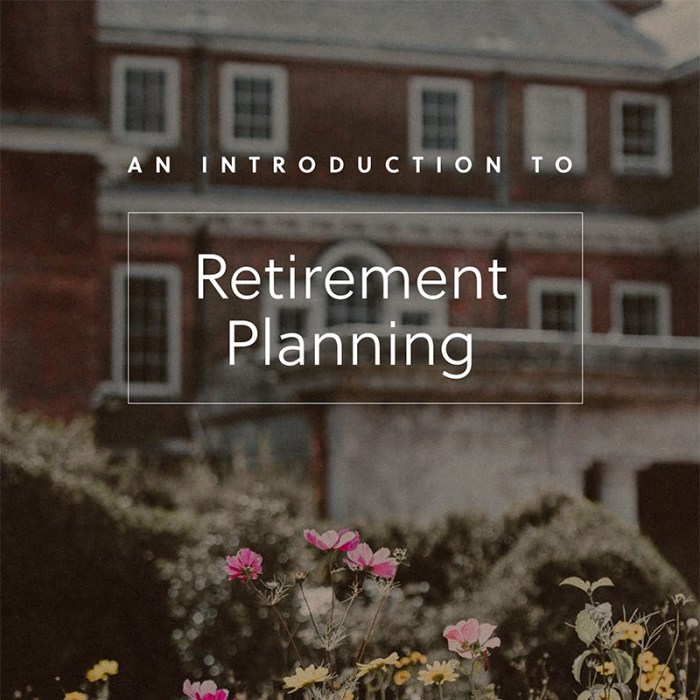Retirement Planning Guide sets you on the path to financial security and stability for the long haul. Dive into the ins and outs of retirement planning with this comprehensive guide that will have you ready to take on the future with confidence.
Importance of Retirement Planning: Retirement Planning Guide

Retirement planning is like the secret sauce for financial stability in your golden years. It’s all about setting yourself up for success when the 9-5 grind is a thing of the past.
Starting Early Pays Off Big Time
Getting a head start on retirement planning is like scoring a front-row seat at a concert – you’re in the best position to enjoy the show. By starting early, you give your money more time to grow and work its magic through the power of compound interest.
The Risks of Flying Solo Without a Plan
- Living on a fixed income can feel like being on a rollercoaster without a seatbelt. Without a solid retirement plan, you risk outliving your savings and struggling to make ends meet.
- Medical emergencies or unexpected expenses can throw a wrench in your retirement dreams if you haven’t planned for them. It’s like trying to build a house without a blueprint – disaster waiting to happen.
- Missing out on employer-sponsored retirement benefits means leaving money on the table. It’s like turning down free pizza – who does that?
Steps to Start Retirement Planning
When it comes to starting your retirement planning journey, there are a few key steps to keep in mind to set yourself up for a secure financial future.
Setting Retirement Goals and Objectives
- Determine your desired retirement age and lifestyle to calculate how much you need to save.
- Consider factors like healthcare costs, travel plans, and other expenses specific to your retirement goals.
- Set specific savings targets and milestones to track your progress over time.
Investment Options for Retirement Planning
- 401(k) or employer-sponsored retirement plans: Take advantage of employer matching contributions and tax benefits.
- Individual Retirement Accounts (IRAs): Choose between traditional IRAs with tax-deferred savings or Roth IRAs with tax-free withdrawals in retirement.
- Stocks, bonds, and mutual funds: Diversify your investment portfolio based on your risk tolerance and retirement timeline.
Retirement Savings Strategies
When it comes to planning for retirement, choosing the right savings strategy is crucial. Let’s dive into the various options available to help you build a solid financial foundation for your golden years.
401(k) vs. IRA vs. Roth IRA
- 401(k): A 401(k) is an employer-sponsored retirement savings plan that allows you to contribute a portion of your pre-tax income towards retirement. One of the key advantages of a 401(k) is that some employers offer matching contributions, essentially free money towards your retirement fund.
- IRA (Individual Retirement Account): An IRA is a retirement savings account that you open on your own. There are different types of IRAs, including Traditional and Roth IRAs. Traditional IRAs offer tax-deferred growth, while Roth IRAs provide tax-free withdrawals in retirement.
- Roth IRA: A Roth IRA is funded with after-tax dollars, meaning you won’t pay taxes on your withdrawals in retirement. This can be a great option if you expect to be in a higher tax bracket when you retire.
Maximizing Retirement Savings through Employer Contributions
Take advantage of employer matching contributions to maximize your retirement savings. If your employer offers to match a percentage of your 401(k) contributions, make sure to contribute at least enough to get the full match. It’s essentially free money that can significantly boost your retirement fund.
Compound Interest and Its Impact on Retirement Savings
Compound interest is like a magic trick that can supercharge your retirement savings over time. It’s the interest you earn on both your initial investment and the interest that has already been added to your account. The key is to start saving early to benefit from the power of compounding.
Creating a Retirement Budget
Planning your retirement budget is crucial for ensuring financial stability during your golden years. By estimating your expenses and income accurately, you can stay on track and make necessary adjustments as needed.
Estimating Retirement Expenses and Income
- Start by listing all your expected expenses in retirement, including housing, healthcare, food, transportation, and leisure activities.
- Factor in inflation and potential healthcare costs, as they tend to increase as you age.
- Consider sources of retirement income such as Social Security, pensions, 401(k) distributions, and any other savings or investments.
- Calculate how much you will need to cover your expenses based on your income sources and desired lifestyle.
Adjusting the Retirement Budget Over Time
- Regularly review and update your budget to reflect any changes in expenses or income.
- Be prepared to make adjustments based on unforeseen circumstances or changes in your financial situation.
- Consider working with a financial advisor to help you optimize your retirement budget and investments.
Social Security and Medicare

Social Security and Medicare play crucial roles in retirement planning, providing financial support and healthcare benefits for individuals in their retirement years.
Social Security Eligibility and Benefits
- To be eligible for Social Security benefits, individuals must have worked and paid Social Security taxes for a certain number of years.
- The amount of Social Security benefits received is based on the individual’s earnings history and the age at which they choose to start receiving benefits.
- Benefits can start as early as age 62, but full retirement age for Social Security purposes is typically between 66 and 67, depending on the year of birth.
- Delaying benefits beyond full retirement age can result in increased monthly benefits.
Medicare Coverage and Integration
- Medicare is a federal health insurance program for individuals aged 65 and older, as well as certain younger individuals with disabilities.
- Medicare consists of different parts, including Part A (hospital insurance) and Part B (medical insurance), with optional coverage such as Part D (prescription drug coverage) and Medigap (supplemental insurance).
- Integrating Medicare benefits into retirement planning involves understanding the coverage options available and factoring in healthcare costs when creating a retirement budget.
- It is important to consider how Medicare benefits will work alongside other retirement savings and healthcare coverage to ensure comprehensive and affordable healthcare in retirement.
Estate Planning in Retirement
Estate planning is a crucial component of retirement planning as it ensures that your assets are distributed according to your wishes after you pass away. It involves creating a plan for transferring your wealth to your beneficiaries in the most tax-efficient manner possible.
Creating a Will
Creating a will is a fundamental aspect of estate planning. A will is a legal document that Artikels how you want your assets to be distributed upon your death. It is essential to update your will regularly to reflect any changes in your financial situation or family circumstances.
Establishing a Trust
Establishing a trust is another important part of estate planning. A trust allows you to transfer assets to a trustee who will manage and distribute them according to your instructions. Trusts can help avoid probate, maintain privacy, and provide more control over how your assets are distributed.
Planning for Inheritance
Planning for inheritance involves deciding how you want to pass on your assets to your heirs. This may include setting up trusts, creating a gifting strategy, or designating beneficiaries for retirement accounts and life insurance policies. It’s essential to consider the tax implications of inheritance and seek professional advice to ensure your assets are passed on efficiently.
Protecting Assets and Beneficiaries, Retirement Planning Guide
Estate planning can help protect your assets and beneficiaries by minimizing taxes, avoiding probate, and ensuring that your wishes are carried out. By creating a comprehensive estate plan, you can provide for your loved ones and safeguard your legacy for future generations.










